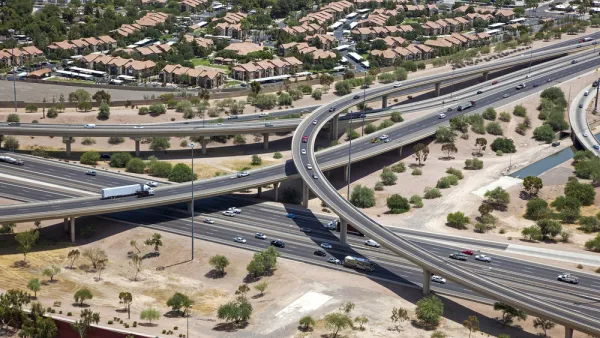Even with ambitious electric Vehicle adoption, the United States must reduce vehicle miles traveled by 20 percent before the end of the decade to limit warming to 1.5°C, according to new research by the Rocky Mountain Institute.

Brian Yudkin, Duncan Kay, Jane Marsh, and Jackson Tomchek writes for the Rocky Mountain Institute:
Beyond the climate consequences resulting from transportation emissions, this high baseline of driving has given rise to a range of societal ills in American cities. These include inequitable access to destinations, disconnected communities, and the nearly universal frustration of congestion. Our highway system has served to segregate populations, heightening long-standing injustices, while high costs of living and limited housing options continue to facilitate sprawl away from city centers.
RMI analysis indicates that the United States must reduce VMT by 20 percent before the end of the decade to limit warming to 1.5°C—and this remains true even under ambitious EV adoption scenarios.
The article continues to details some of the interventions that can reduce vehicle miles traveled (VMT), like pricing signals, ending highway expansions, and transportation demand management and provides an infographic to illustrate the effects of some of those interventions.
FULL STORY: Our Driving Habits Must Be Part of the Climate Conversation

National Parks Layoffs Will Cause Communities to Lose Billions
Thousands of essential park workers were laid off this week, just before the busy spring break season.

Retro-silient?: America’s First “Eco-burb,” The Woodlands Turns 50
A master-planned community north of Houston offers lessons on green infrastructure and resilient design, but falls short of its founder’s lofty affordability and walkability goals.

Delivering for America Plan Will Downgrade Mail Service in at Least 49.5 Percent of Zip Codes
Republican and Democrat lawmakers criticize the plan for its disproportionate negative impact on rural communities.

Test News Post 1
This is a summary

Test News Headline 46
Test for the image on the front page.

Balancing Bombs and Butterflies: How the National Guard Protects a Rare Species
The National Guard at Fort Indiantown Gap uses GIS technology and land management strategies to balance military training with conservation efforts, ensuring the survival of the rare eastern regal fritillary butterfly.
Urban Design for Planners 1: Software Tools
This six-course series explores essential urban design concepts using open source software and equips planners with the tools they need to participate fully in the urban design process.
Planning for Universal Design
Learn the tools for implementing Universal Design in planning regulations.
EMC Planning Group, Inc.
Planetizen
Planetizen
Mpact (formerly Rail~Volution)
Great Falls Development Authority, Inc.
HUDs Office of Policy Development and Research
NYU Wagner Graduate School of Public Service





























